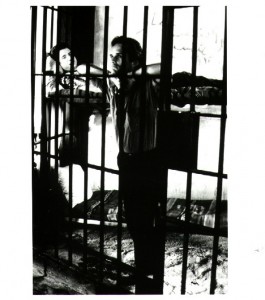Poetry is dead! Long live poetry!
Writers keep writing about the end of writing.
The English department is declining. Comparative literature has died. Book reviews? Print journalism? Poetry?
There’s just one problem: no one gets into details. I want to know exactly when and why literature, and poetry in particular, will croak. Will it happen in bed or on the street? Will poetry die in peace, or in the throes of a guilty conscience?
And so, in the style of the solemn journalism covering this crisis, I offer a few speculative reports for a nonexistent newspaper (call it my personal musepaper).
*
They Know Why the Caged Bird Sings: As Poetry Perishes, Prison Population Soars
CHICAGO -- As a result of poetry’s slow yet unquestionable death, droves of impoverished versifiers -- writers who once worked as teachers or editors, or who relied on grants, fellowships, and publications for financial survival -- have been filling the nation’s debtor’s prisons.
The first to note the phenomenon were the few remaining poets still conducting outreach workshops in jails. They were surprised by their students’ enthusiastic participation and polished writing. The only problem, reported one instructor, was a high degree of competitiveness among her pupils; one student described another’s work as “unbearingly knowing, with a jangling quality that hearkens to Pope.”
A guard described walking down the cellblock and finding prisoners in what appeared to be collusive discussion. He cocked his gun and approached with caution, only to discover what one prisoner confirmed as a “collegial conversation” on “Islands, Isolation, and Themes of Imprisonment in Early Donne.”
Another guard witnessed a tête-à-tête between an older and a younger prisoner occurring in the former’s cell. Demanding the reason for this meeting, the younger prisoner mentioned he was seeking direction on his dissertation, an exploration of the Beat aesthetic.
This reporter secured an interview with the younger prisoner. “After my M.F.A., I was unsure what to do with myself,” the man explained. “I was several thousand dollars in debt, and thinking about a PhD, but I kept hearing the discipline of English had died. When I learned that several of my favorite poets and scholars had gathered in this debtor’s prison, I jumped at the chance. I’ll be here for about 5-7 years, which should be enough time to teach some composition courses to younger prisoners, and get in a good draft of my dissertation.”
Upon further questioning, the younger prisoner clarified that he had, in fact, sneaked into the debtor’s prison.
“I’m happy here,” he said. “We’ve even founded a school of sorts – the Prison School of Poetry. We’re largely influenced by the works of Sir Walter Raleigh and the bards of the Irish independence movement, who wrote songs and poems on the eves of their executions.”
Report submitted from within debtor’s prison. Having endured numerous lectures on “the death of journalism,” this reporter decided to move in herself.
*
It’s hard to imagine an obituary for poetry until we know exactly why and when it will die, but here’s how one might start.
Poetry, Remembered as Gentle Source of Readerly Exaltation, Murdered in Bath
Poetry, an esteemed verbal art relying on compression, form, metaphor, or other means to achieve heightened literary and aesthetic effect, died Thursday when longtime companions Prose, Technology, and Incomprehension initiated a brutal attack at Poetry’s home in New Jersey. Poetry was at least 4,000 years old.
*
It’s equally hard to speculate on the aftermath of poetry’s death, but we can be confident New Mexicans will play a prominent role.
In “Desert Places,” Poetry Cited -- and Sighted
ROSWELL—Since poetry’s demise last January 23, believers here and in other remote locations across America claim the form is not dead at all.
Mary McPherson, 32, was driving down Clovis Highway when she noticed the air shimmering strangely above the pavement. Scientists would cite extreme heat as the reason for the phenomenon. But McPherson has another opinion.
“It was a moment of loveliness that seemed loaded with significance,” she said. “No one will believe me, but I swear there was poetry in it.”
Robert Hache, 65, reported an equally uncanny event at the grocery store. “I was passing through the soup aisle, and suddenly I heard someone say, ‘Oops! Oops! I spilled the soups,’” he remarked. “It reminded me of the poetry I used to read when I was little. Everyone tells me that poetry is dead, but I’m not so sure.”
Psychologist Sinda Turner at the University of New Mexico described these apparitions as a normal element of grieving. “We tend to keep seeing the departed, in various senses, for years after the death,” she said. “Think of Elvis.”
She said she’s attempted to confirm the death of poetry with colleagues in the university’s poetry MFA program, but could not find the poetry professors. “People say they’ve moved to prison, where they’ve founded a new school, and have already published several anthologies,” she said. “I’m not sure what to make of that. New Mexicans are very imaginative."
Abigail Deutsch, the winner of Poetry magazine's 2010 Editors Prize for Reviewing, lives in New York...
Read Full Biography


